Our Library
Explore our publications, from research papers and series to educational materials, covering all aspects of conflict transformation and peace promotion.
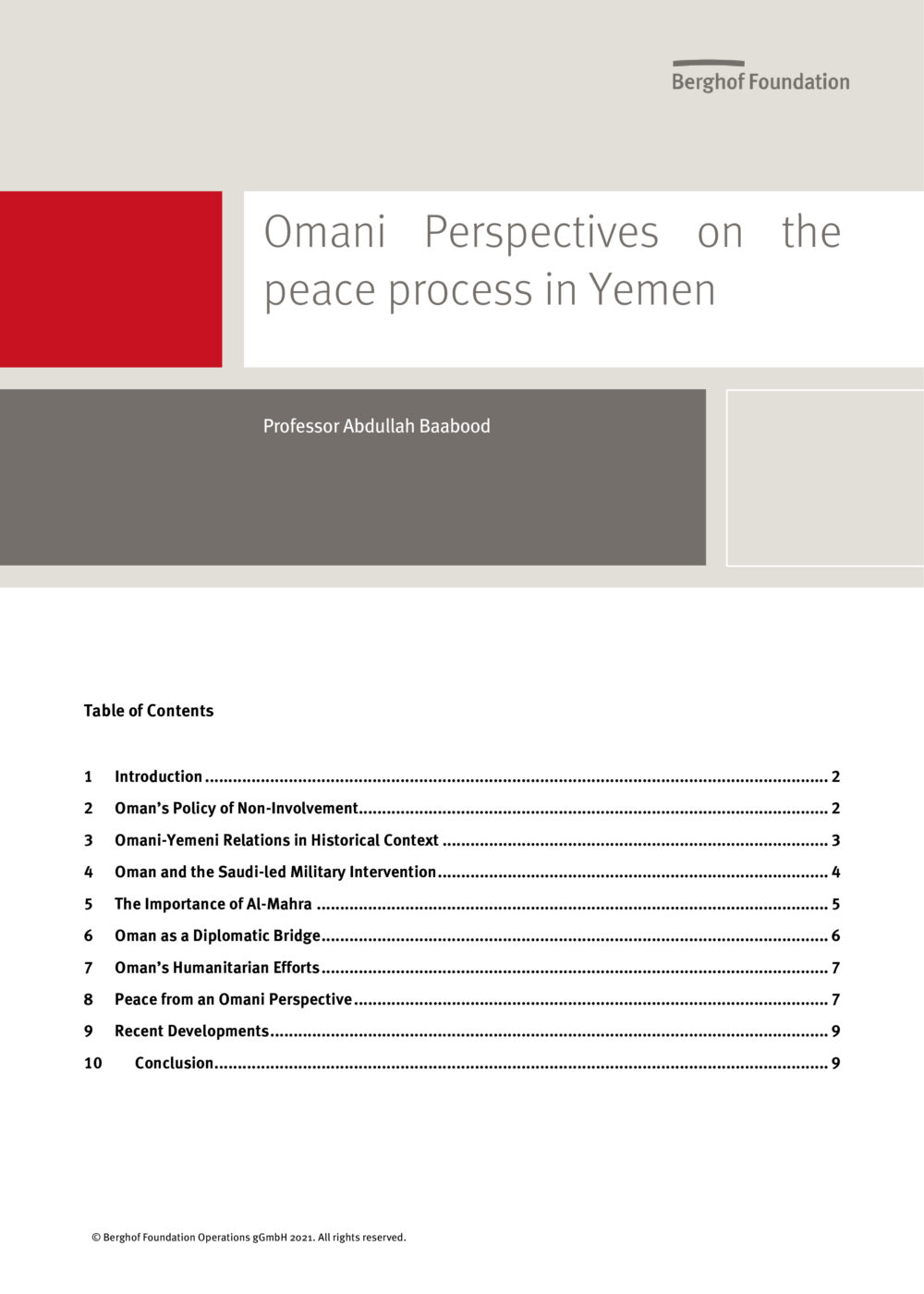
Omani perspectives on the peace process in Yemen
Oman has played an important role in supporting mediation efforts since the conflict in Yemen began. The country’s amicable relations with Saudi Arabia, Ansar Allah, Iran, and other Yemeni and international conflict stakeholders has allowed it to facilitate negotiations in a manner few other countries are able or willing to realise. This comes in the context of Oman’s established history of attempting to bring conflicting parties from its immediate western neighbour to the table at critical junctures. These efforts were again reactivated in early 2021 with the facilitation of talks between belligerents in the current conflict and international representatives in Muscat.
- Year2021
- Author(s)Abdullah Baabood
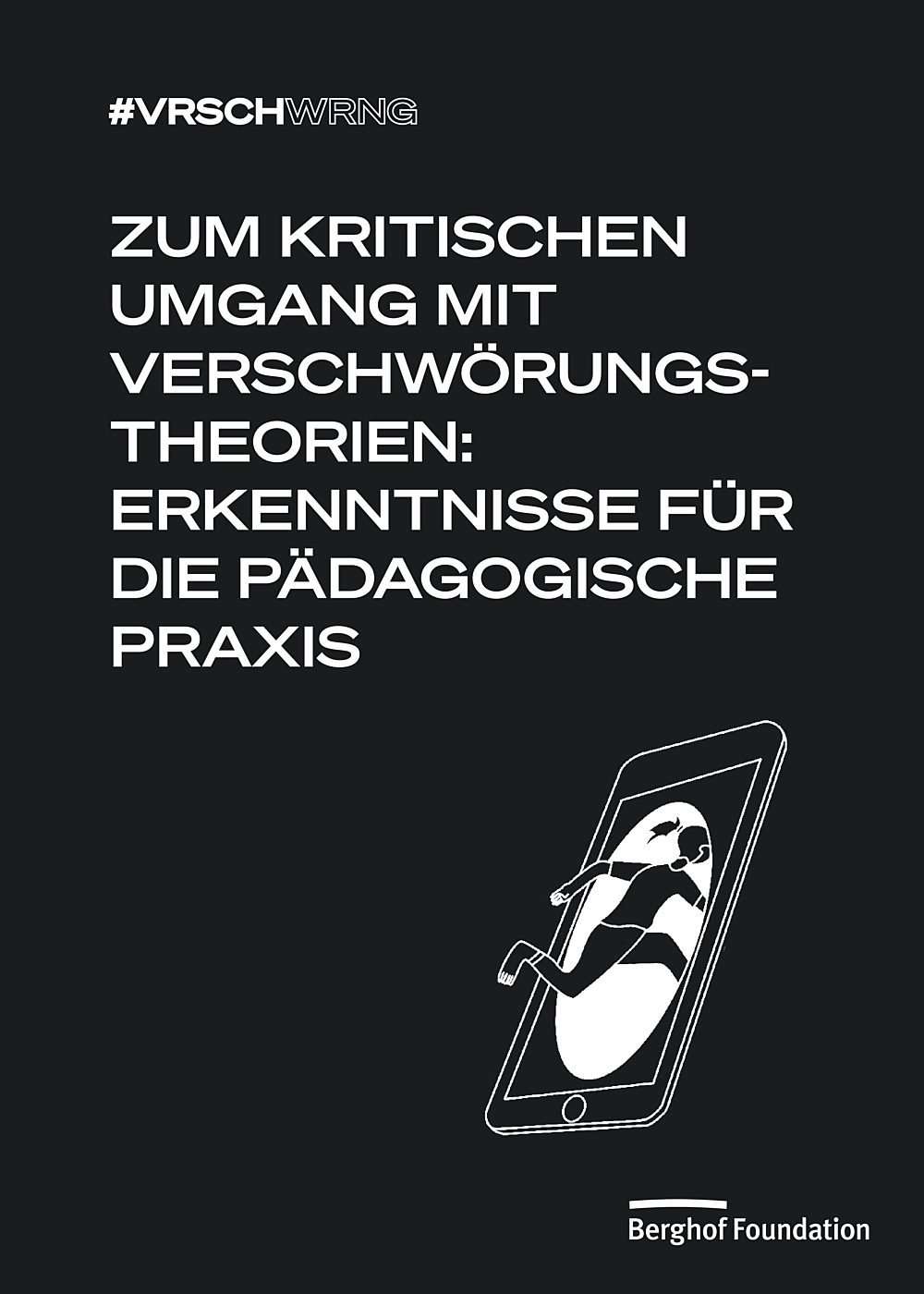
Zum Kritischen Umgang mit VerschwörungstheorienErkenntnisse für die Pädagogische Praxis
Seit Anfang 2020 führt die Berghof Foundation im Rahmen des Bundesprogrammes Demokratie leben! ein mehrjähriges Modellprojekt zum Thema durch. Das Ziel: Die Entwicklung eines Toolkits gegen Verschwörungstheorien, gemeinsam mit Jugendlichen und für Jugendliche. Dazu hat im September 2020 eine interdisziplinäre digitale Fachtagung mit Expert*innen aus Wissenschaft und Praxis stattgefunden. Aus dieser Tagung ist der vorliegende Band entstanden. Die darin enthaltenen Beiträge sollen die wichtige aktuelle Diskussion über angemessene (pädagogische) Gegenmaßnahmen zur Verbreitung von Verschwörungstheorien und zur Stärkung von demokratischen und friedensorientierten Grundhaltungen bereichern.
- Year2021
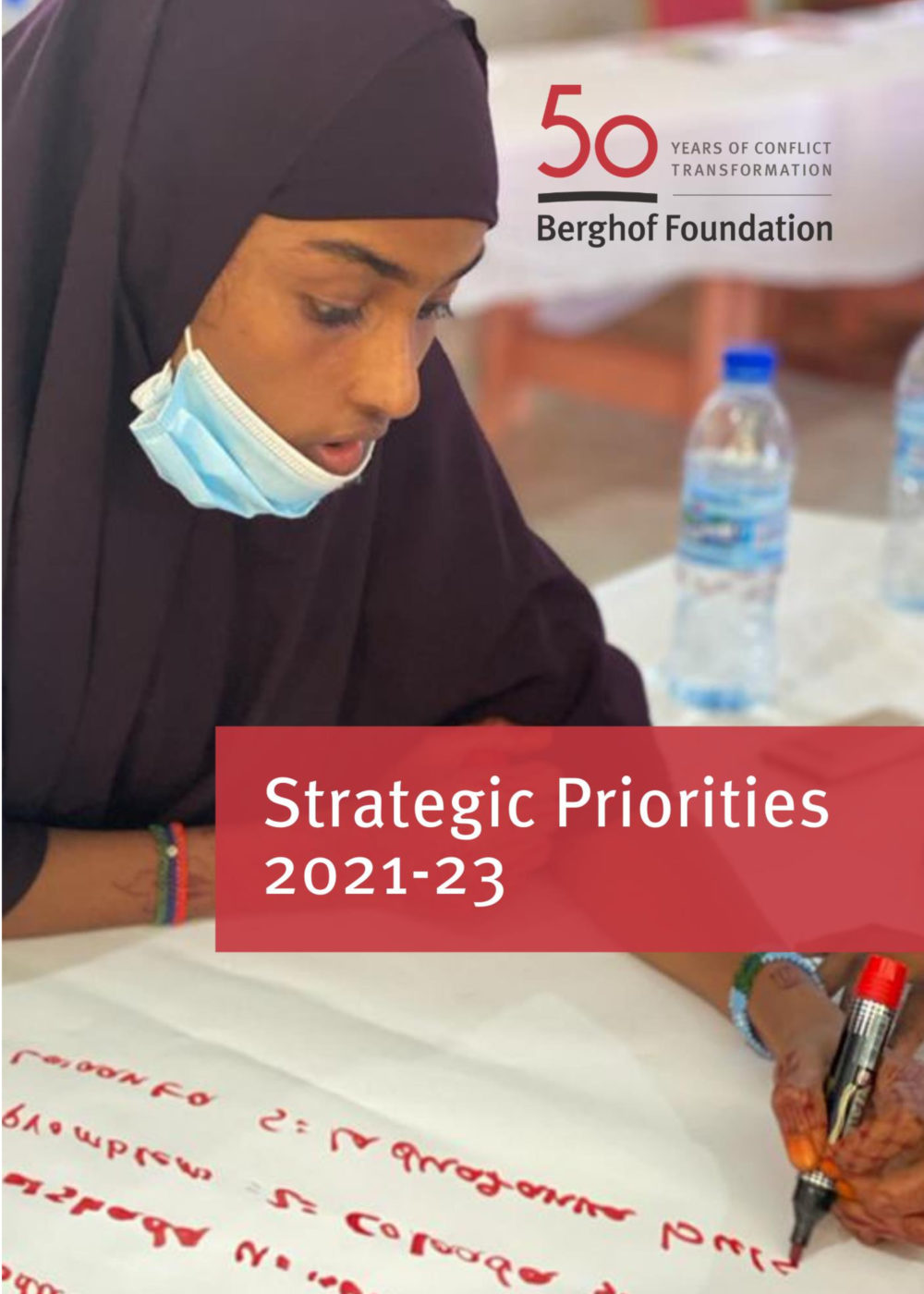
Berghof Foundation: Strategic Priorities 2021-2023
In light of the shifting global context, the Berghof Foundation as an organisation has to adapt as well. We are therefore expanding our activities beyond our established focal areas into six additional areas of strategic importance. This involves building up new expertise, new forms of collaboration, and new ways of working. This work has already begun. How Berghof intends to go about it over the next three years is the subject of this document.
- Year2021
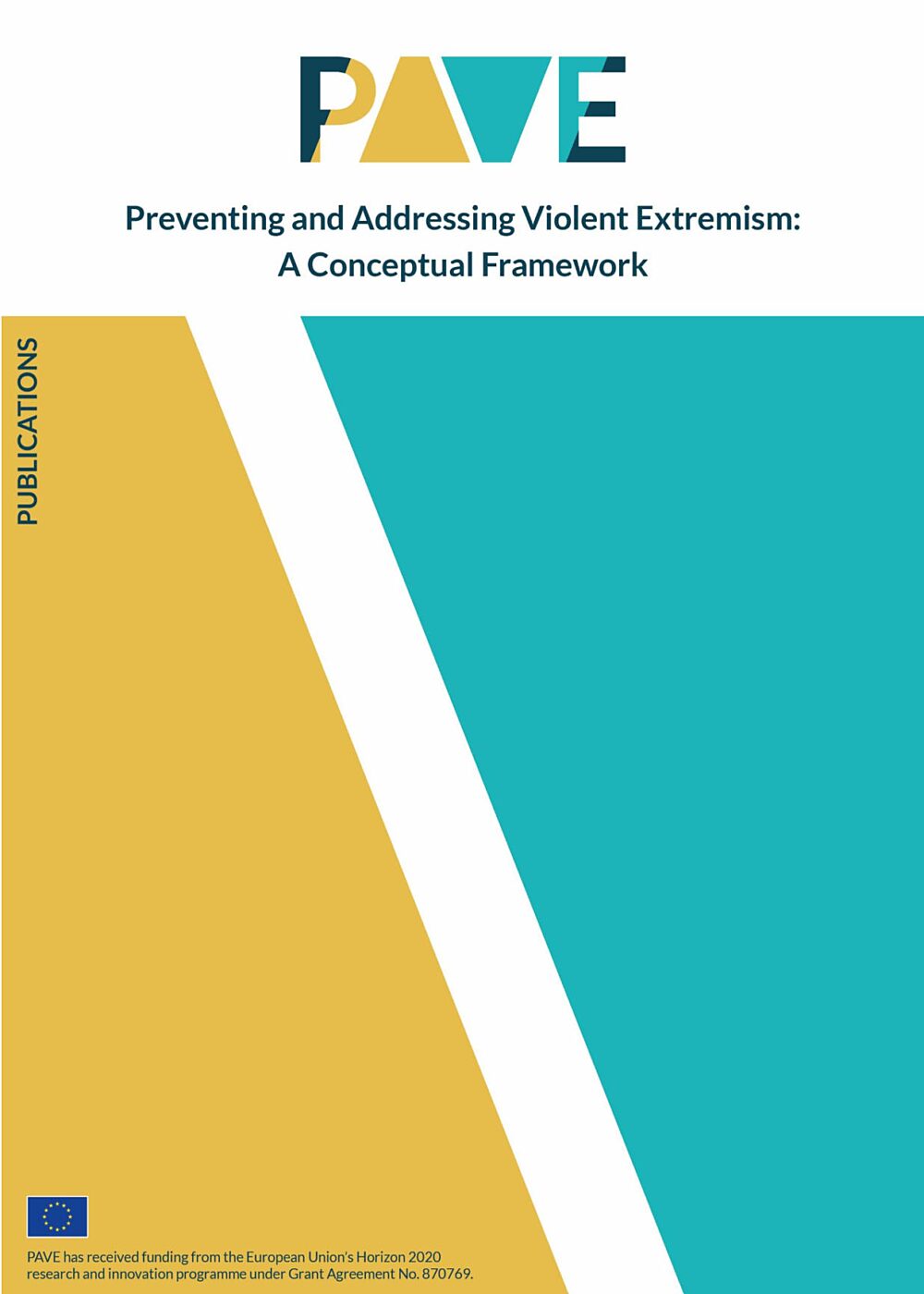
Preventing and addressing violent extremismA conceptual framework
This paper represents the theoretical framework behind the PAVE project that aims to tackle the issue of radicalisation by examining its root causes and driving factors.
The project is based on a comparative assessment of local communities' vulnerability or resilience to violent extremism in seven countries: Bosnia and Herzegovina, Iraq, Kosovo, Lebanon, North Macedonia, Serbia and Tunisia.
- Year2021
- Author(s)Maja Halilovic Pastuovic, Gillian Wylie, Karin Göldner-Ebenthal, Johanna-Maria Hülzer, Véronique Dudouet
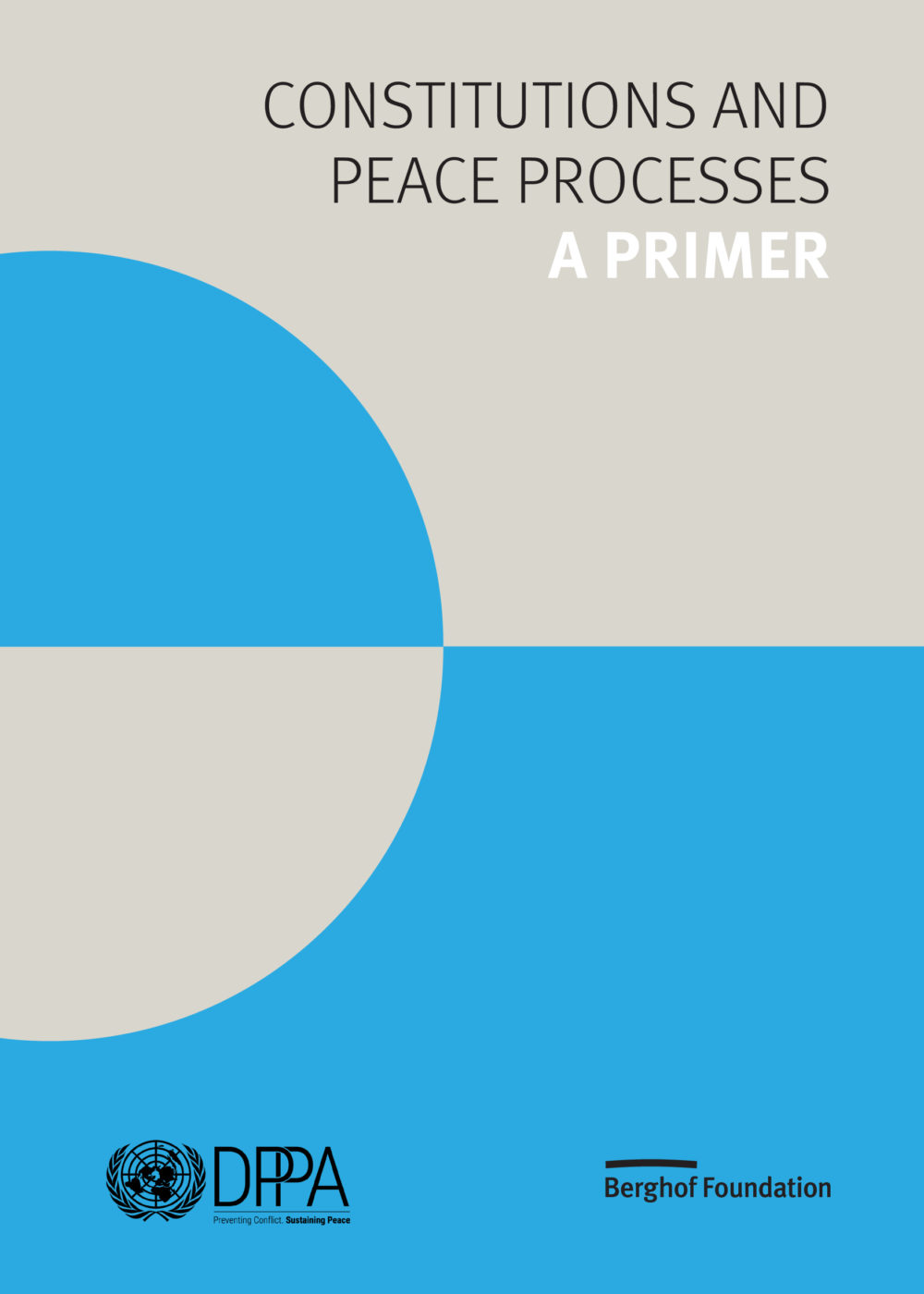
Constitutions and peace processes: A primer
Peace processes often confront conflict issues that have deep constitutional relevance, and yet the obvious link to “constitution making” and the need for constitutional expertise are seldom acknowledged. The role of constitution making in peace processes is understudied and there is little practical guidance for individuals involved in peace processes, especially the mediators, negotiators and other actors who support them, on how to engage with constitutional elements in peace processes.
- Year2021
- Author(s)Berghof Foundation, United Nations DPPA – Mediation Support Unit
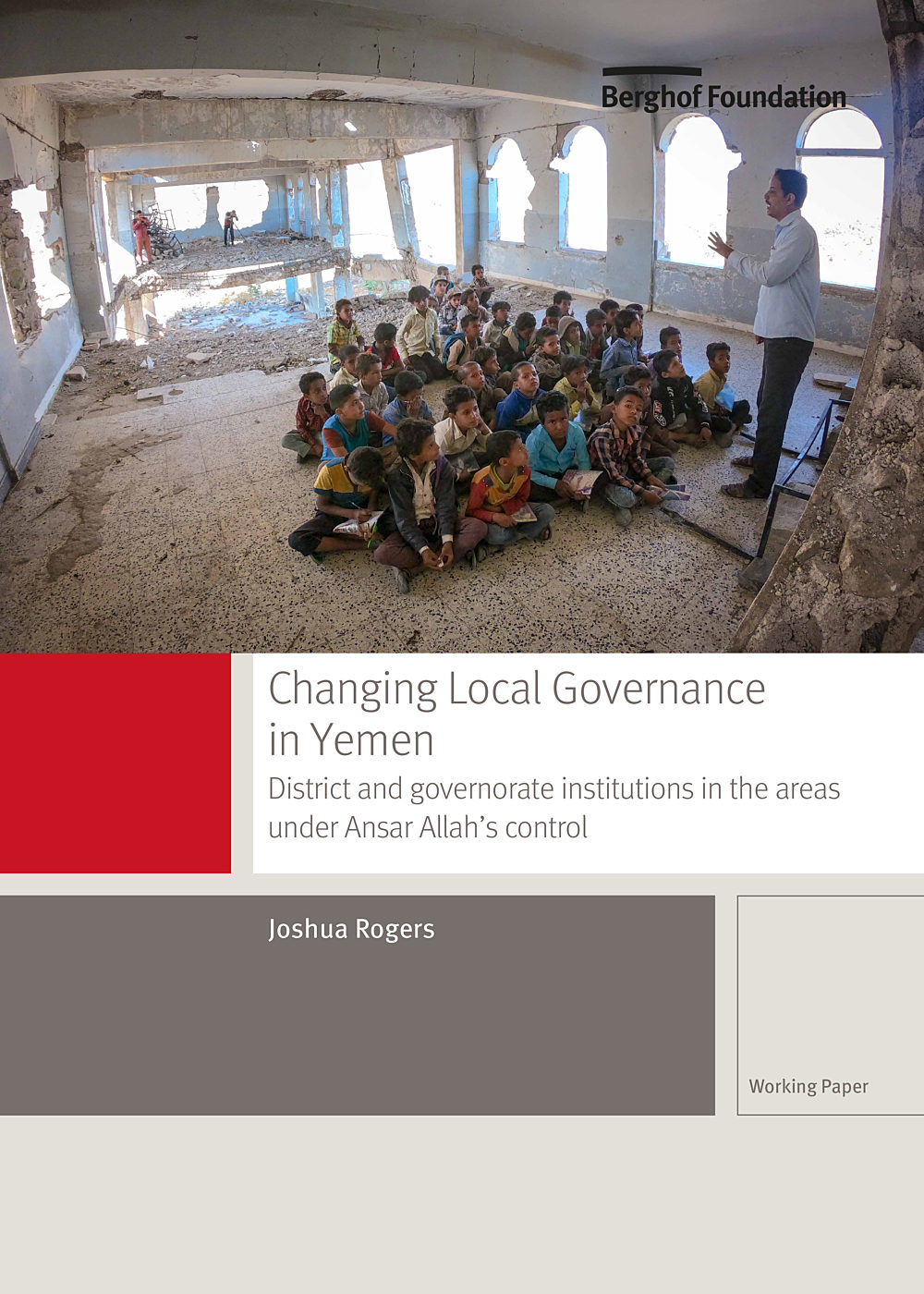
Changing local governance in YemenDistrict and governorate institutions in the areas under Ansar Allah's control
The Berghof Foundation has been working with local authorities and the central administration(s) in Yemen since 2017 to strengthen inclusive local governance, support the resolution of local conflicts, and ensure that key concerns from the local level feed into central policy-making and the peace process. This working paper contributes to these overall goals by exploring how local governance is changing in the areas under Ansar Allah’s control. Subsequent papers will explore local-level changes in other parts of Yemen, notably in Aden and Hadhramawt. The peace process will need to take these ongoing changes into account.
- Year2020
- Author(s)Joshua Rogers
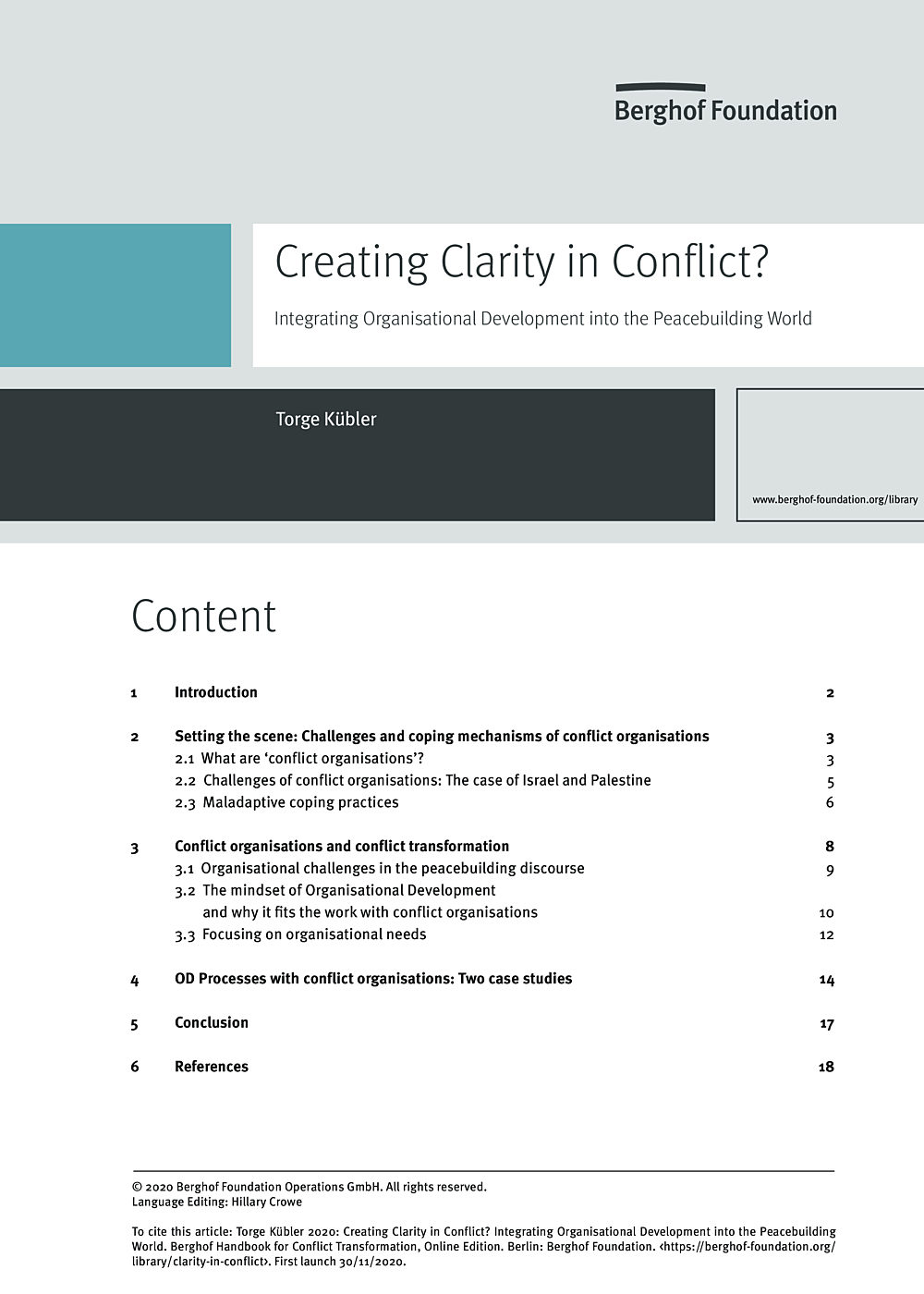
Creating Clarity in Conflict? Integrating Organisational Development into the Peacebuilding WorldHandbook Article
Organisations working in and on conflict face unique challenges that can impact their work and approaches on peacebuilding and conflict transformation. Do we know how to deal with them?
To improve the development of mechanisms and processes that suit the complex nature of peacebuilding endeavors, this article examines how Organisational Development (OD) can contribute to strategies that help to overcome organisational challenges.
- Year2020
- Author(s)Torge Kübler
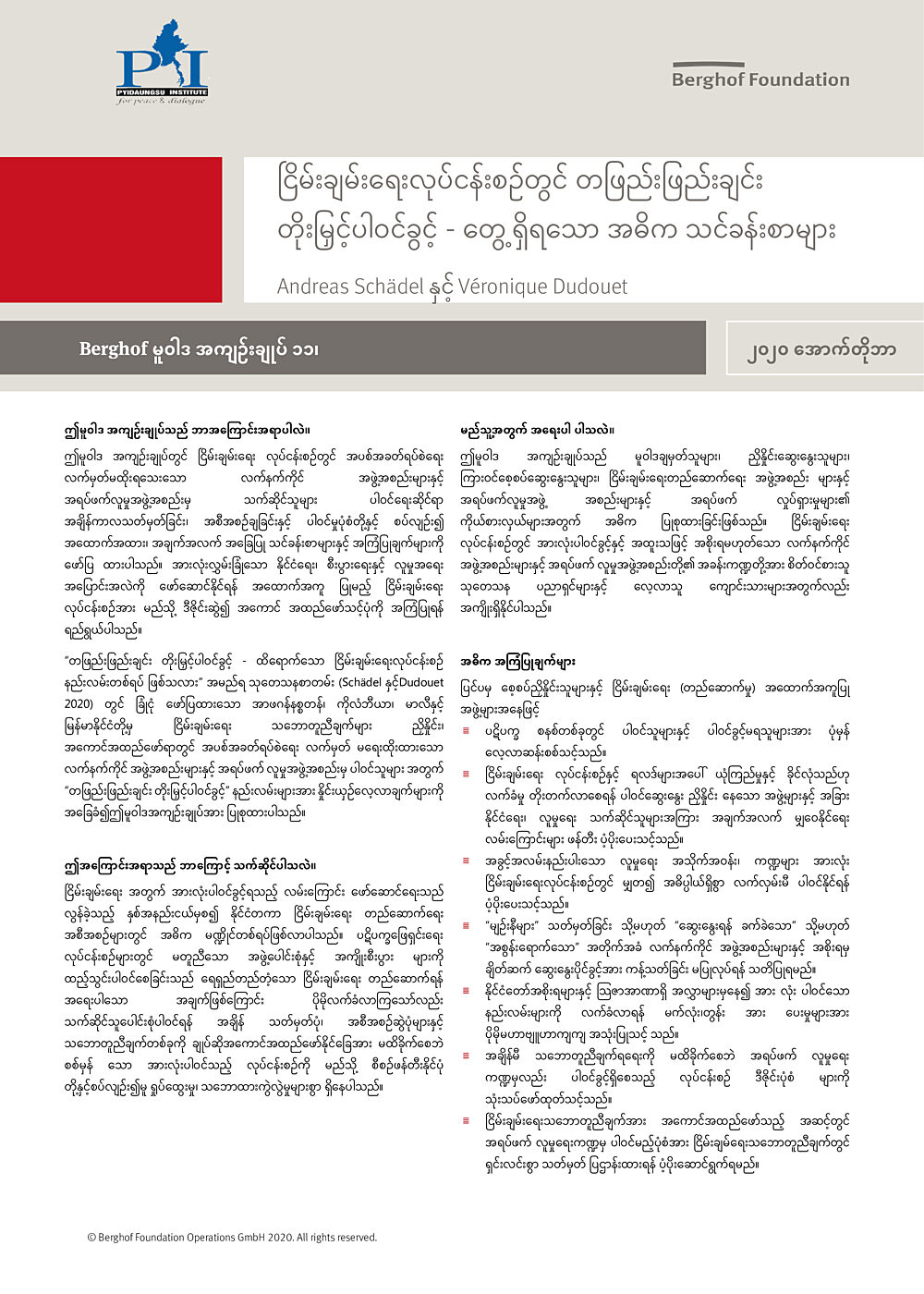
ငြိမ်းချမ်းရေးလုပ်ငန်းစဥ်တွင် တဖြည်းဖြည်းချင်း တိုးမြှင့်ပါဝင်ခွင့် - တွေ့ရှိရသော အဓိက သင်ခန်းစာများBerghof Policy Brief 11
ဤမူဝါဒ အကျဥ်းချုပ်တွင် ငြိမ်းချမ်းရေး လုပ်ငန်းစဥ်တွင် အပစ်အခတ်ရပ်စဲရေး လက်မှတ်မထိုးရသေးသော လက်နက်ကိုင် အဖွဲ့အစည်းများနှင့် အရပ်ဖက်လူမှုအဖွဲ့အစည်းမှ သက်ဆိုင်သူများ ပါဝင်ရေးဆိုင်ရာ အချိန်ကာလသတ်မှတ်ခြင်း၊ အစီအစဥ်ချခြင်းနှင့် ပါဝင်မှုပုံစံတို့နှင့် စပ်လျဥ်း၍ အထောက်အထား၊ အချက်အလက် အခြေပြု သင်ခန်းစာများနှင့် အကြံပြုချက်များကို ဖော်ပြ ထားပါသည်။ အားလုံးလွှမ်းခြုံသော နိုင်ငံရေး၊ စီးပွားရေးနှင့် လူမှုအရေး အပြောင်းအလဲကို ဖော်ဆောင်နိုင်ရန် အထောက်အကူ ပြုမည့် ငြိမ်းချမ်းရေး လုပ်ငန်းစဥ်အား မည်သို့ ဒီဇိုင်းဆွဲ၍ အကောင် အထည်ဖော်သင့်ပုံကို အကြံပြုရန် ရည်ရွယ်ပါသည်။
- Year2020
- Author(s)Andreas Schädel, Véronique Dudouet
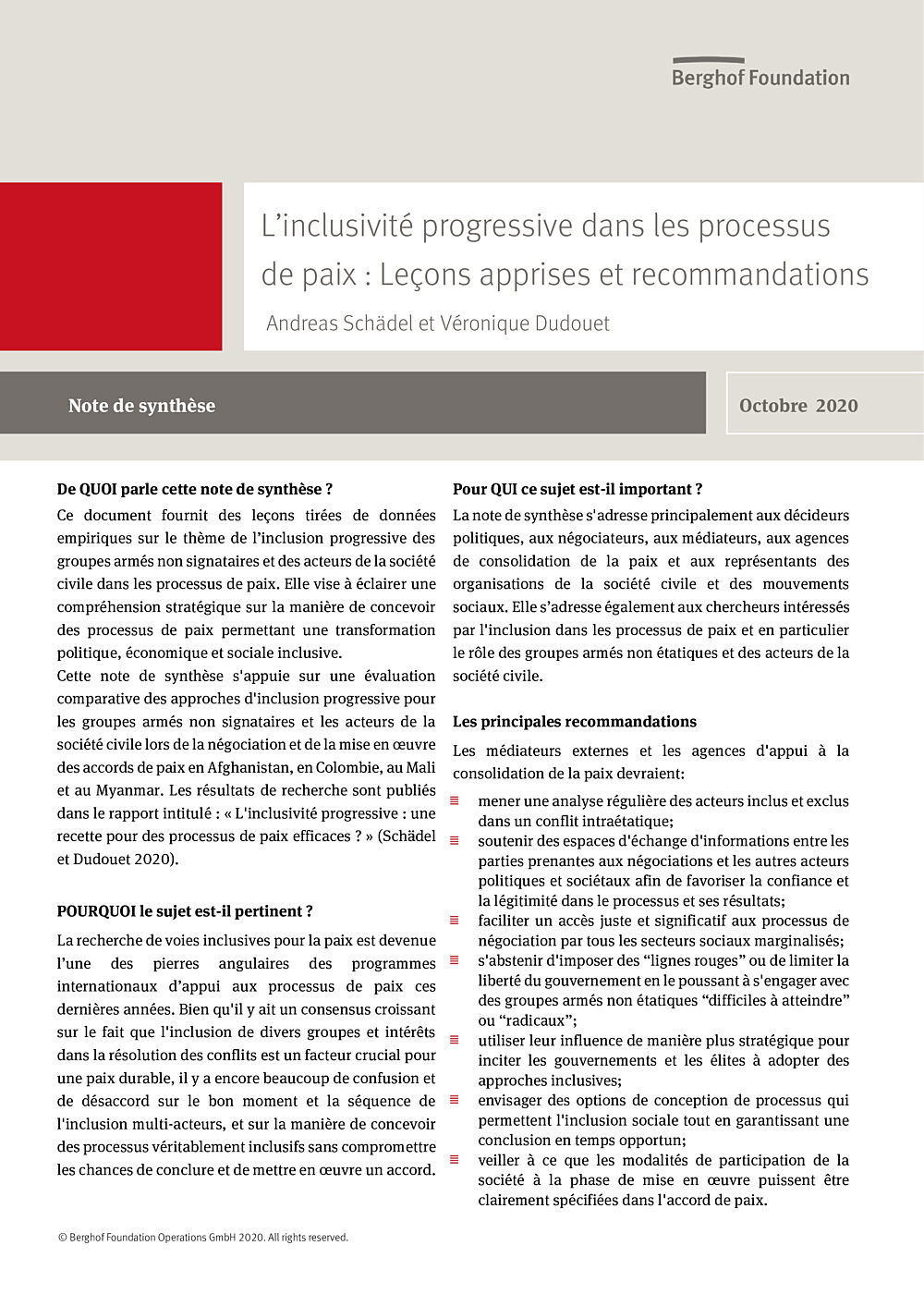
L’inclusivité progressive dans les processus de paix : Leçons apprises et recommandationsBerghof Policy Brief 11
Ce document fournit des leçons tirées de données empiriques sur le thème de l’inclusion progressive des groupes armés non signataires et des acteurs de la société civile dans les processus de paix. Elle vise à éclairer une compréhension stratégique sur la manière de concevoir des processus de paix permettant une transformation politique, économique et sociale inclusive.
- Year2020
- Author(s)Andreas Schädel, Véronique Dudouet
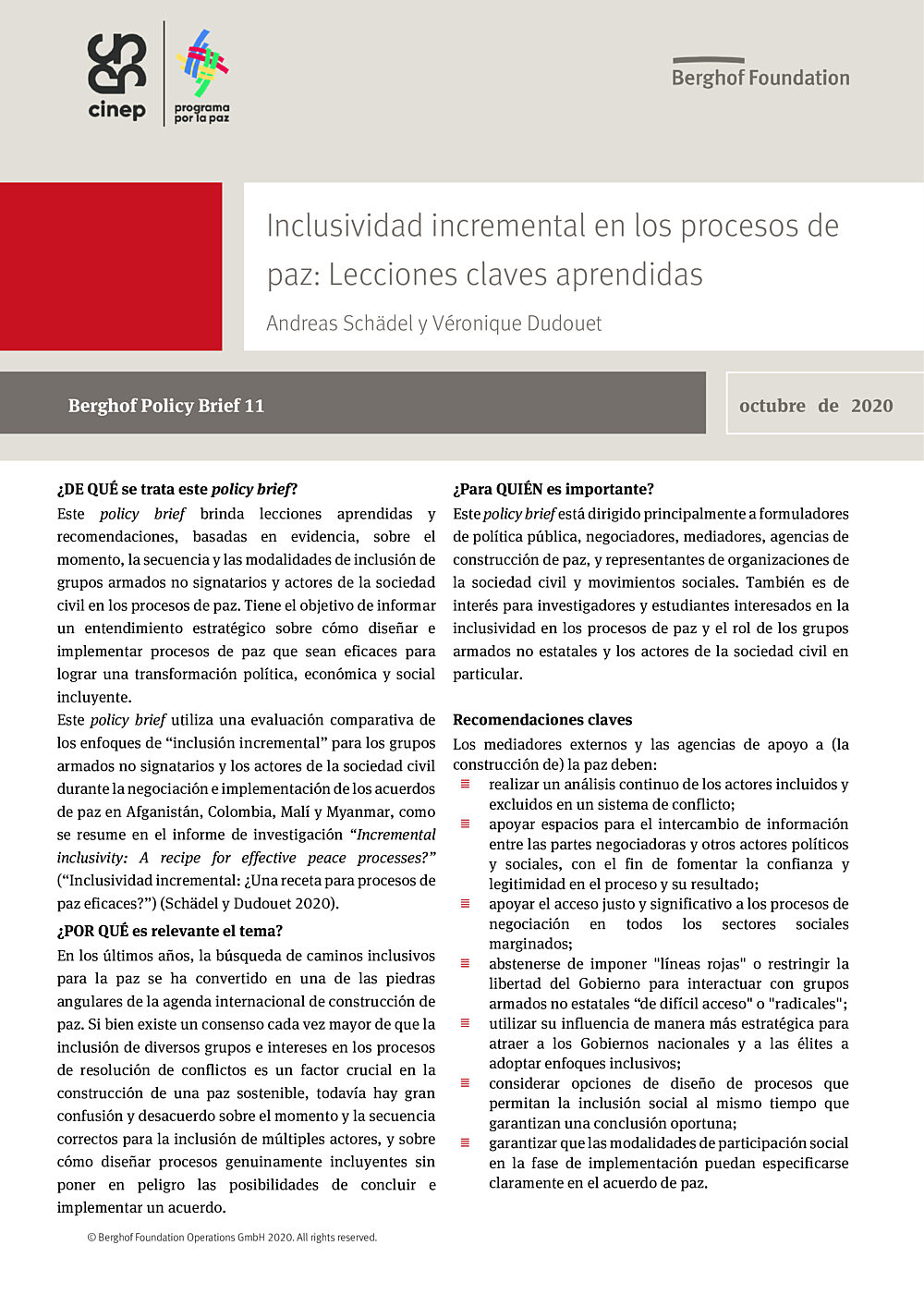
Inclusividad incremental en los procesos de paz: Lecciones claves aprendidasBerghof Policy Brief 11
Este policy brief brinda lecciones aprendidas y recomendaciones, basadas en evidencia, sobre el momento, la secuencia y las modalidades de inclusión de grupos armados no signatarios y actores de la sociedad civil en los procesos de paz. Tiene el objetivo de informar un entendimiento estratégico sobre cómo diseñar e implementar procesos de paz que sean eficaces para lograr una transformación política, económica y social incluyente.
- Year2020
- Author(s)Andreas Schädel, Véronique Dudouet